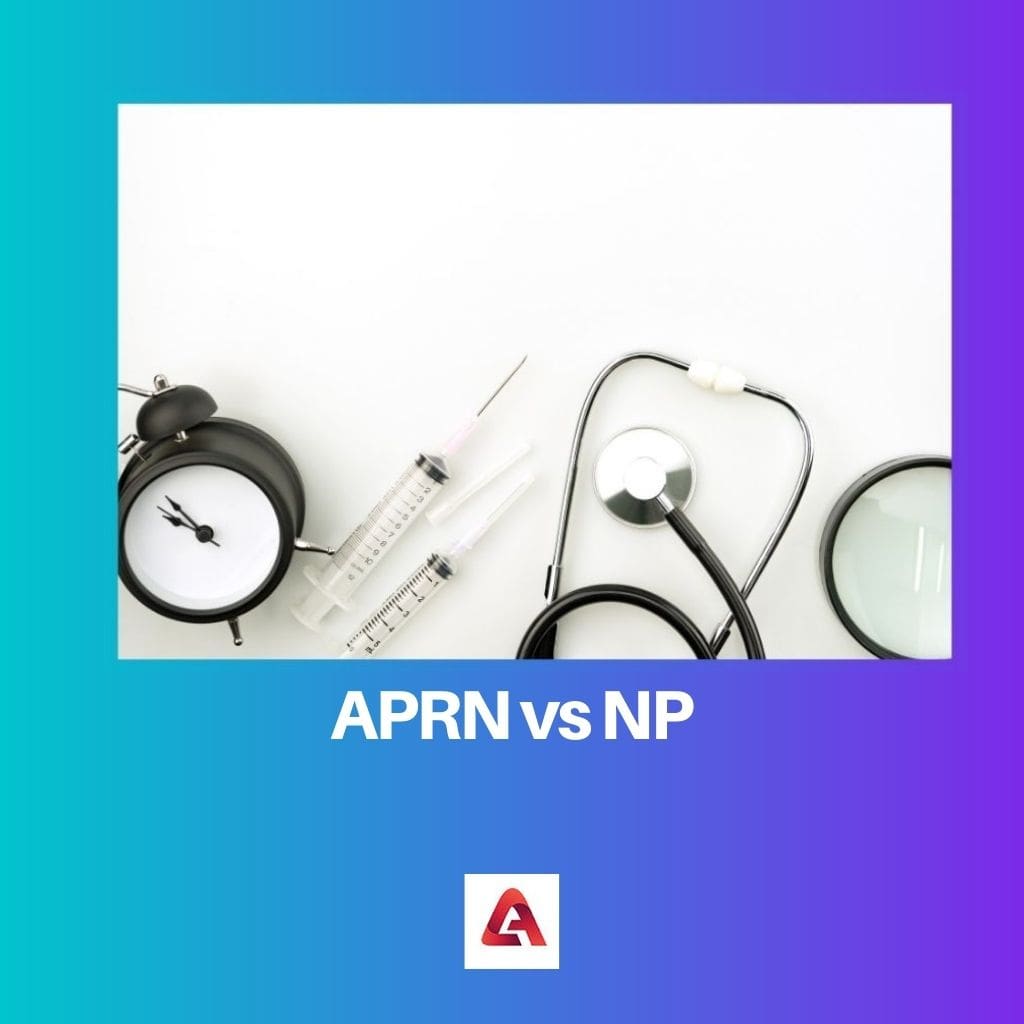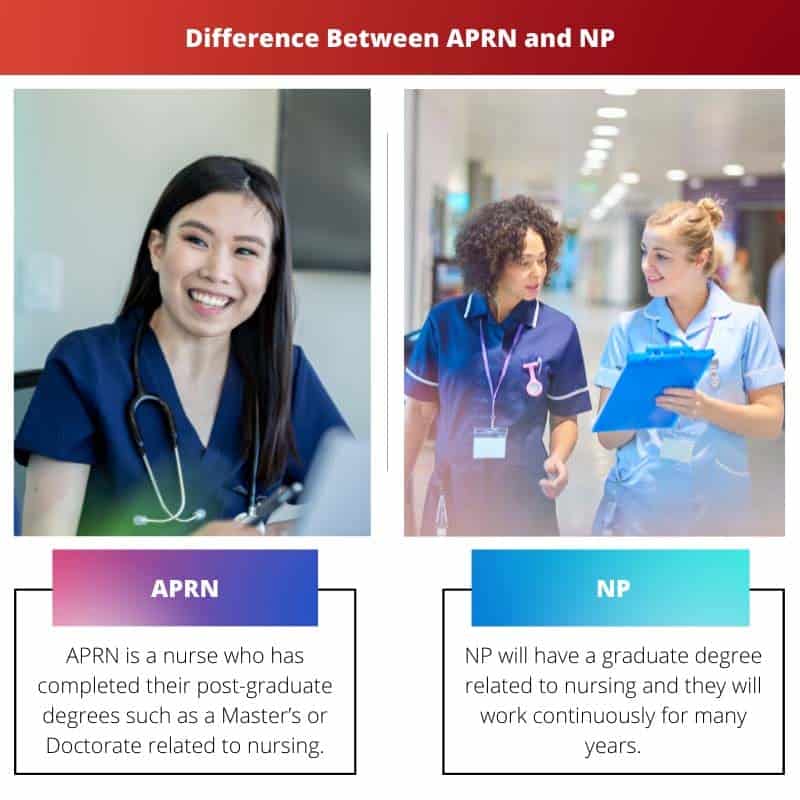The Health Care industry provides the highest service to people worldwide. Nursing plays a crucial role in the healthcare industry.
Nurses are valuable professionals holding degrees related to their specialization.
Key Takeaways
- APRN (Advanced Practice Registered Nurse) is a broad category of nursing professionals who have completed advanced education and training, which may include nurse practitioners, certified nurse midwives, and clinical nurse specialists.
- NP (Nurse Practitioner) is a specific type of APRN who has completed a nurse practitioner program, has advanced clinical skills, and can diagnose, treat, and prescribe medications for patients.
- APRNs and NPs play vital roles in healthcare, but NPs are a specific subset of APRNs with a distinct scope of practice.
APRN vs NP
APRN (Advanced Practice Registered Nurse) are fully capable of seeing patients on their own and are extensively trained to diagnose and provide treatment for conditions. A NP (Nurse Practitioner) is an advanced practice registered nurse. They specialize in treating patients and preparing them for the doctor.

APRNs and NP provide healthcare services to patients and perform the required duties based on specialization. APRN is a nurse who needs a postgraduate degree to achieve APRN, and they offer patient care based on their role limits.
NP is nothing but a Nurse Practitioner and a subset of APRN. It requires a graduate degree related to nursing to become an NP.
They provide acute and primary services related to healthcare and continuously work in an organized manner with their patients. There are many similarities between the two. However, there are a few differences as well.
APRNs and NP are related to the nursing occupation, offer health care services to their patients, and perform various duties based on their specialization.
Comparison Table
| Parameters of Comparison | APRN | NP |
|---|---|---|
| Education | A minimum Master’s degree is needed to attend any of the specialization exams related to APRN. | At least a Master of Science in Nursing is a minimum for NP. Later, a Doctor of Nursing Practice may be optionally needed. |
| Typical Duties | Based on specialization, duties vary. For example, surgical management is taken care of by nurse anaesthetics. | NP offers both acute and primary services related to healthcare by diagnosing the illness and regularly monitoring the patient’s health. |
| Medications | Only a few have the authority to prescribe medicines based on their specialization and the state. | NP can prescribe medicines. Based on the state laws in practice, the types of drugs to be prescribed must be decided. |
| Collaborators | An agreement is unnecessary as APRNs will associate and work with hospital doctors, administrators, nurses, and other staff. | For some states, NP should mandatorily have collaborative agreements with physicians for them to practice. |
| Continuing Requirements | Based on nurse specialization, continuity of education may be needed. | Mandatory re-certification is needed. For re-certification, a minimum of 1000 hours of clinical practice and 75 hours of education based on the current role. |
What is APRN?
APRN is nothing but an ‘Advanced Practice Registered Nurse’. APRN is a nurse who has completed a post-graduate degree, such as a Master’s or Doctorate related to nursing.
APRN offers patient care based on their role limits as they are licensed with the help of the state board of nursing. In some states, they are given the authority to prescribe medication and practice on their own without the oversight of a physician. APRN is defined as a registered nurse capable of making complex decisions.
They are highly knowledgeable and have the required clinical ability for extended practice as defined by the International Council of Nurses. There are four types of APRN roles, and they are,
- Nurse Practitioners (NP)
- Clinical Nurse Specialists (CNS)
- Certified nurse-midwives (CNM)
- Certified Nurse Anesthetists (CNA)
APRNs can work across different healthcare-related facilities, such as hospitals, long-term care facilities, and ambulatory clinics. In some states, APRNs can practice independently; in others, they need to have an agreement with their physician, which is termed a collaborative agreement.

What is NP?
NP is nothing but a Nurse Practitioner and a subset of APRN. NP will have a graduate degree related to nursing, and they will work continuously for many years in an organized manner with their patients.
They provide referrals for the required specialized health care. NPs are professionally qualified and offer both acute and primary services related to healthcare.
There are some pre-requisites to becoming an NP; one must either have an MS in Nursing or a Doctor of Nursing Practice in one of the six fields mentioned below,
- Neonatal
- Paediatrics
- Psychiatric
- Adult-Gerontology
- Family/Individual Across Life Span
- Gender-Related
NPs are permitted to perform the following services,
- Monitoring the individual’s history and carrying out a physical examination.
- Educating healthy habits and lifestyle.
- Managing lab tests and other procedures.
- Diagnosing the illness and regularly monitoring the patient’s health.
- Properly analyzing the patient’s health history and treating the disease.

Main Differences Between APRNs and NP
- APRNs and NP have educated professionals in nursing, providing service for the healthcare industry. They provide healthcare services for different patients. The main difference between APRN and NP is that NP is a subset of APRN. NP mandatorily need a Master’s degree or a Doctorate to attempt and achieve APRN, whereas a Graduate or Master of Science degree related to nursing is needed to become an NP.
- APRNs can practice in private clinics, hospitals, or even in settings related to education or healthcare, whereas NP can practice in ambulatory, personal, and community clinics.
- APRNs have four specializations or roles: CRNA, CNM, CNS and NP. In contrast, NP specialises in family health, neonatal, pediatric primary care, mental health, etc.
- APRN does not need any agreement for practice as they will associate and work with hospital doctors, administrators, nurses and other staff. In contrast, NP needs collaborative contracts with physicians for training.
- Few APRNs have the authority to prescribe medicines based on their specialization and working state. In contrast, NP can prescribe medicines based on the state laws on practice, and the types of drugs to be prescribed needs to be decided.


The continual pursuit of advanced education and clinical practice requirements for APRNs and NPs illustrates the unwavering commitment to maintaining excellence in patient care.
Their dedicated focus on ongoing education and re-certification reflects the healthcare sector’s dedication to upholding the highest standards of service delivery and quality patient outcomes.
The distinction between APRN and NP is essential in understanding the complexity of the nursing profession. It’s beneficial for patients to know the differences in their roles.
The educational requirements and duties are markedly different, highlighting the specialized nature of their responsibilities in healthcare.
Agreed, the specific duties and capabilities of each are distinct and necessary for informed patient care.
APRNs and NPs remain integral to the multi-disciplinary healthcare landscape, with their diverse roles contributing to the overall quality and precision of care provided to patients.
Their collaborative practice and specialized focus augment the healthcare system’s efficiency, driving continuous advancements in patient-centered care.
The intricate balance between their collaborative and individual roles showcases both the adaptability and specialized knowledge necessary for effective practice, shaping the future of healthcare delivery.
The comprehensive understanding of APRN and NP roles, along with their educational pathways, provides valuable insights into the nursing profession’s multifaceted contributions to healthcare.
The complexities of APRN and NP roles underscore the diversity of skills and knowledge required to adapt to evolving healthcare needs, shaping a dynamic landscape.
The collaborative and independent aspects of APRN and NP’s professional practice emphasize the adaptability and resourcefulness necessary for nursing in diverse healthcare settings.
Their ability to work independently and collaboratively underscores the dynamic nature of their role, indicating the vital role nurses play in the healthcare continuum.
The specialized areas NPs can practice in, and the detailed requirements highlight the dedication and expertise inherent in the field, significantly contributing to patient care.
The focused scope of NPs and the specific fields they specialize in underscores the depth of knowledge and commitment they bring to delivering specialized care.
The comprehensive preparation and distinct roles of NPs reflect a nuanced approach to healthcare, ensuring tailored and effective interventions for diverse patient groups.
The level of expertise and advanced training involved in becoming an APRN and NP is commendable. Their significant contribution to healthcare is evident in the quality of patient care.
Their extensive knowledge and clinical ability are integral in addressing complex patient needs, ensuring the delivery of high-quality care.
It is impressive how APRNs and NPs manage the ongoing demands of healthcare with their specialized focus, ensuring patients receive the best treatment.
The distinction between APRN and NP, as well as their unique capabilities in patient care, demonstrates the depth and rigor of the nursing profession.
Absolutely, the specific roles of APRNs and NPs showcase the specialized expertise required for efficient patient care.
Without the healthcare industry, we wouldn’t be able to function properly and nurses are crucial in this system. They are highly skilled and valuable professionals.
Absolutely, the important role they play in patient care and recovery is undeniable.
Nurses are the backbone of healthcare, with their expertise and knowledge, they provide a wide range of essential services.
APRNs and NPs are indispensable in delivering healthcare services, and the differences in their scope of practice highlight the diverse roles they undertake.
It’s fascinating to observe how APRNs and NPs navigate their distinct responsibilities with a commitment to patient care, contributing significantly to the healthcare ecosystem.
Their combination of clinical skills and educational background allows APRNs and NPs to fulfill critical roles in the healthcare sector.